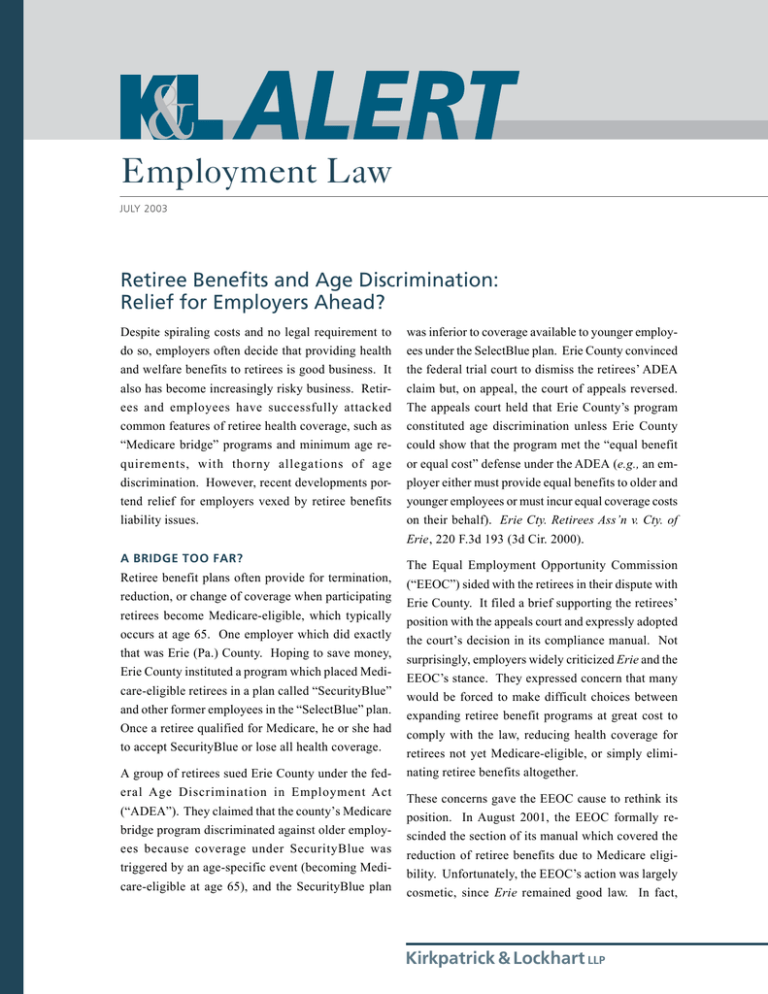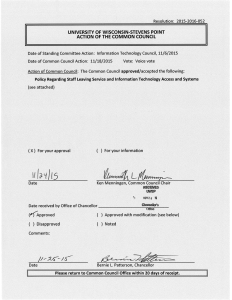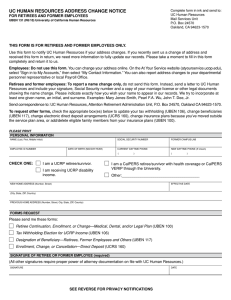
Employment Law
JULY 2003
Retiree Benefits and Age Discrimination:
Relief for Employers Ahead?
Despite spiraling costs and no legal requirement to
do so, employers often decide that providing health
and welfare benefits to retirees is good business. It
also has become increasingly risky business. Retirees and employees have successfully attacked
common features of retiree health coverage, such as
“Medicare bridge” programs and minimum age requirements, with thorny allegations of age
discrimination. However, recent developments portend relief for employers vexed by retiree benefits
liability issues.
A BRIDGE TOO FAR?
Retiree benefit plans often provide for termination,
reduction, or change of coverage when participating
retirees become Medicare-eligible, which typically
occurs at age 65. One employer which did exactly
that was Erie (Pa.) County. Hoping to save money,
Erie County instituted a program which placed Medicare-eligible retirees in a plan called “SecurityBlue”
and other former employees in the “SelectBlue” plan.
Once a retiree qualified for Medicare, he or she had
to accept SecurityBlue or lose all health coverage.
A group of retirees sued Erie County under the federal Age Discrimination in Employment Act
(“ADEA”). They claimed that the county’s Medicare
bridge program discriminated against older employees because coverage under SecurityBlue was
triggered by an age-specific event (becoming Medicare-eligible at age 65), and the SecurityBlue plan
was inferior to coverage available to younger employees under the SelectBlue plan. Erie County convinced
the federal trial court to dismiss the retirees’ ADEA
claim but, on appeal, the court of appeals reversed.
The appeals court held that Erie County’s program
constituted age discrimination unless Erie County
could show that the program met the “equal benefit
or equal cost” defense under the ADEA (e.g., an employer either must provide equal benefits to older and
younger employees or must incur equal coverage costs
on their behalf). Erie Cty. Retirees Ass’n v. Cty. of
Erie, 220 F.3d 193 (3d Cir. 2000).
The Equal Employment Opportunity Commission
(“EEOC”) sided with the retirees in their dispute with
Erie County. It filed a brief supporting the retirees’
position with the appeals court and expressly adopted
the court’s decision in its compliance manual. Not
surprisingly, employers widely criticized Erie and the
EEOC’s stance. They expressed concern that many
would be forced to make difficult choices between
expanding retiree benefit programs at great cost to
comply with the law, reducing health coverage for
retirees not yet Medicare-eligible, or simply eliminating retiree benefits altogether.
These concerns gave the EEOC cause to rethink its
position. In August 2001, the EEOC formally rescinded the section of its manual which covered the
reduction of retiree benefits due to Medicare eligibility. Unfortunately, the EEOC’s action was largely
cosmetic, since Erie remained good law. In fact,
Kirkpatrick & Lockhart LLP
courts in other jurisdictions began to follow the decision in Erie. See, e.g., Lawrence v. Town of
Irondequoit, 246 F. Supp.2d 150 (W.D.N.Y. 2002).
This left employers with or contemplating retiree
health plans in the rather untenable position of having to balance the threat of being sued under Erie
against the EEOC’s decision to distance itself from
Erie’s holding.
This predicament begged for equal doses of clarity
and pragmatism and, it would now appear, concrete
relief may be on the way. In a notice published in the
July 14, 2003 Federal Register, the EEOC announced
a proposed rule that would essentially reverse Erie
through rulemaking.
The proposed rule would make it clear that employers could coordinate retiree health benefits with
Medicare eligibility without incurring ADEA liability. Specifically exempted from the ADEA would be
the practice of eliminating, reducing or changing retiree health care coverage when retirees become
eligible for Medicare or similar state-sponsored health
coverage. The proposed rule also provides that employers may continue to offer Medicare carve-out
plans (i.e., plans that offer to Medicare-eligible retirees only those benefits not provided through
Medicare). To be applied prospectively, this exemption would cover both existing and newly created
employer plans. It would also apply to dependent
and spousal health benefits included in the retiree coverage, although these additional benefits need not be
identical to that provided to retirees. Employers still
need to be cautious, though, since the proposed exemption is a narrow one which only covers retirees.
DOUBLE REVERSE?
Another common feature of retiree benefit plans is a
minimum age requirement for eligibility. One employer to implement a minimum age requirement was
General Dynamics Land Systems, Inc. (“General
Dynamics”). General Dynamics had an old policy
providing full health benefits to retirees with 30 or
more years of service. In labor negotiations with its
2
union, General Dynamics eliminated retiree benefits,
with one notable exception: employees 50 years or
older as of the effective date of the new collective
bargaining agreement remained eligible to receive full
health benefits.
Employees under the age of 50 alleged age discrimination and promptly sued General Dynamics pursuant
to the ADEA. They claimed they were in the class of
people protected by the ADEA (employees 40 years
or older), and they were treated less favorably than
other employees on account of their age. Never mind
that the employees treated more favorably were older;
it was enough, said the plaintiffs, that the ADEA
singled out employees 40 years or older for special
protection. The district court disagreed, as have other
courts addressing analogous arguments, see Hamilton
v. Caterpillar, Inc., 966 F.2d 1226 (7th Cir. 1992);
Schuler v. Polaroid Corp., 848 F.2d 276 (1st Cir. 1988),
but the plaintiffs found the court of appeals to be far
more sympathetic. The appeals court held that, so
long as employees are 40 years or older, they can sue
the employer under the ADEA if they allege they were
treated less favorably than any other group of employees based on their age. Cline v. General
Dynamics Land Systems, Inc., 296 F.3d 466 (6 th Cir.
2002). While the appeals court tried to distance itself from the term “reverse discrimination,” the
decision molds a claim for reverse discrimination
under the ADEA.
The General Dynamics decision creates considerable
potential for mischief. Any sort of minimum age
requirement must now be suspect if it affects employees age 40 or over. The impact of General Dynamics
is likely to be particularly far-reaching as it pertains
to retiree benefit plans, since a number of them predicate eligibility on reaching a minimum age. However,
the viability of the General Dynamics decision has
recently become an open question. A few months
ago, the United States Supreme Court agreed to review the appeals court’s decision. Cline v. General
Dynamics Land Systems, Inc., 296 F.3d 466, cert.
granted sub nom. 2003 U.S. Lexis 2949 (U.S., Apr.
KIRKPATRICK & LOCKHART LLP EMPLOYMENT LAW ALERT
21, 2003). Although the Supreme Court’s decision
to review the General Dynamics decision on reverse
discrimination does not guarantee that it will be reversed, it does mean that the Supreme Court will pay
close attention to the issues raised and, hopefully,
provide concrete guidance to employers wrestling
with retiree benefit plans.
Age discrimination is not a subject to be taken lightly,
so the combination of Erie and General Dynamics
has made employers skittish whenever the subject of
retiree benefits is raised. However, the EEOC’s proposed rule and the Supreme Court’s decision to review
the General Dynamics decision means employers may
be able to breathe a little easier when it comes time to
evaluate a retiree health plan.
MICHAEL A. PAVLICK
mpavlick@kl.com
412.355.6275
FOR MORE INFORMATION, please contact one of the following K&L lawyers:
Boston
Henry T. Goldman
617.951.9156
hgoldman@kl.com
Dallas
Jaime Ramón
214.939.4902
jramon@kl.com
Harrisburg
Carleton O. Strouss
717.231.4503
cstrouss@kl.com
Los Angeles
Thomas H. Petrides
310.552.5077
tpetrides@kl.com
Paul W. Sweeney, Jr.
310.552.5055
psweeney@kl.com
Miami
Daniel A. Casey
305.539.3324
dcasey@kl.com
Newark
Marilyn Sneirson
973.848.4028
msneirson@kl.com
New York
David R. Marshall
212.536.4066
dmarshall@kl.com
Rory J. McEvoy
212.536.4804
rmcevoy@kl.com
Pittsburgh
Stephen M. Olson
412.355.6496
solson@kl.com
Michael A. Pavlick
412.355.6275
mpavlick@kl.com
Hayes C. Stover
412.355.6476
hstover@kl.com
San Francisco
Jonathan M. Cohen
415.249.1029
jcohen@kl.com
Washington
Lawrence C. Lanpher
202.778.9011
llanpher@kl.com
®
Kirkpatrick & Lockhart LLP
Challenge us. ®
www.kl.com
BOSTON
n
DALLAS
n
HARRISBURG
n
LOS ANGELES
n
MIAMI
n
NEWARK
n
NEW YORK
n
PITTSBURGH
n
SAN FRANCISCO
n
WASHINGTON
.........................................................................................................................................................
This publication/newsletter is for informational purposes and does not contain or convey legal advice. Please note that information
about prevailing law is limited to the particular state or federal jurisdiction(s) covered by the cited law and cases, and stricter
rules may apply in some states. This newsletter should not be relied upon in regard to any particular facts or
circumstances without first consulting a lawyer.
MARCH 2003
Kirkpatrick & Lockhart LLP
© 2003 KIRKPATRICK & LOCKHART LLP.
ALL RIGHTS RESERVED.


